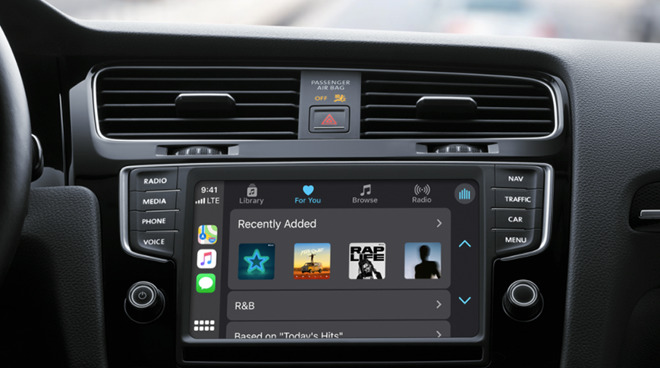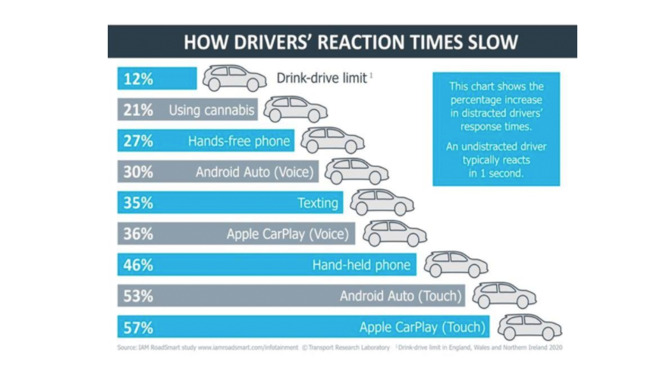Using Apple CarPlay impairs driver reaction more than alcohol, study shows
U.K. based road safety charity IAM RoadSmart has released a study showing how in-vehicle infotainment systems can substantially impair driver's reaction times -- even more than alcohol and cannabis.

Independent consultant company TRL conducted the study on behalf of IAM RoadSmart and the Rees Jefferys Road Fund. The study was conducted to gain insight into how a console infotainment system may impair a driver's reaction time.
The test involved two experimental trials focusing on Android Auto and Apple CarPlay. Twenty Android and twenty Apple users would be subjected to the same simulated test route. Each driver drove three times: A control drive, where they did not interact with the system, a voice-enabled drive where they used the voice system only, and a touch-enabled drive, where they used the touch screen of the system only.
As part of the test, users would be required to follow another car, navigate an erratic motorway, and perform a figure-eight loop. During these tests, users would be told to perform a task, such as accessing music on Spotify, input data into a navigation app, or read texts and take phone calls.
Additionally, participants would be asked to flash their headlights whenever a red bar appeared on the screen, which measured their reaction time to external events.

Image Credit: IAM RoadSmart
Regardless of the infotainment system, all users showed significantly slowed reaction time. Undistracted drivers typically showed a one-second reaction time. Those who used the voice-controlled Apple CarPlay saw a 36% increase in their reaction time, which rose to 57% when they used the touch interface.
Android Auto users faired only slightly better-- a 30% increase in reaction time when using voice control, and 53% when using touch controls.
For comparison, those who drive under the influence at the drink-drive limit showed a 12% increase in reaction time, and those who used cannabis saw a 21% increase.
Those who used Android Auto saw a 1.73-foot (0.53-meter) deviation on their lane positioning when performing navigation tasks with Android Auto. Those who used Apple CarPlay saw a deviation of 1.64 feet (0.50 meters.)
The report states that participants showed significant difficulty in controlling the vehicle's speed and position whenever they interfaced with an infotainment system. Participants also failed to react consistently to awareness checks when engaging with touch-based systems.
Both Android and Apple infotainment systems required users to take their eyes off the road for longer than the National Highway Traffic Safety Administration recommended guidelines. Study participants underestimated the time they spent looking away from the road when engaging with touch controls by up to 5 seconds.
Due to the results of the study, IAM RoadSmart is calling on industry and government to openly test and approve all infotainment systems and develop consistent standards that will help minimize driver distraction.
Apple introduced CarPlay in 2014 as a way to get the most out of a supported infotainment system. Since then, Apple has added to the system with navigation improvements, support for Settings and Calendar, and support for "Hey, Siri." More improvements are expected in iOS 14, with a new wallpaper API and the ability to use Siri to find locations based on seating availability, IMAX showings, or children discounts."

Independent consultant company TRL conducted the study on behalf of IAM RoadSmart and the Rees Jefferys Road Fund. The study was conducted to gain insight into how a console infotainment system may impair a driver's reaction time.
The test involved two experimental trials focusing on Android Auto and Apple CarPlay. Twenty Android and twenty Apple users would be subjected to the same simulated test route. Each driver drove three times: A control drive, where they did not interact with the system, a voice-enabled drive where they used the voice system only, and a touch-enabled drive, where they used the touch screen of the system only.
As part of the test, users would be required to follow another car, navigate an erratic motorway, and perform a figure-eight loop. During these tests, users would be told to perform a task, such as accessing music on Spotify, input data into a navigation app, or read texts and take phone calls.
Additionally, participants would be asked to flash their headlights whenever a red bar appeared on the screen, which measured their reaction time to external events.

Image Credit: IAM RoadSmart
Regardless of the infotainment system, all users showed significantly slowed reaction time. Undistracted drivers typically showed a one-second reaction time. Those who used the voice-controlled Apple CarPlay saw a 36% increase in their reaction time, which rose to 57% when they used the touch interface.
Android Auto users faired only slightly better-- a 30% increase in reaction time when using voice control, and 53% when using touch controls.
For comparison, those who drive under the influence at the drink-drive limit showed a 12% increase in reaction time, and those who used cannabis saw a 21% increase.
Those who used Android Auto saw a 1.73-foot (0.53-meter) deviation on their lane positioning when performing navigation tasks with Android Auto. Those who used Apple CarPlay saw a deviation of 1.64 feet (0.50 meters.)
The report states that participants showed significant difficulty in controlling the vehicle's speed and position whenever they interfaced with an infotainment system. Participants also failed to react consistently to awareness checks when engaging with touch-based systems.
Both Android and Apple infotainment systems required users to take their eyes off the road for longer than the National Highway Traffic Safety Administration recommended guidelines. Study participants underestimated the time they spent looking away from the road when engaging with touch controls by up to 5 seconds.
Due to the results of the study, IAM RoadSmart is calling on industry and government to openly test and approve all infotainment systems and develop consistent standards that will help minimize driver distraction.
Apple introduced CarPlay in 2014 as a way to get the most out of a supported infotainment system. Since then, Apple has added to the system with navigation improvements, support for Settings and Calendar, and support for "Hey, Siri." More improvements are expected in iOS 14, with a new wallpaper API and the ability to use Siri to find locations based on seating availability, IMAX showings, or children discounts."

Comments
I imagine that most people start the car, start a playlist, and then don't interact with it for the rest of the journey.
Years ago Myth Busters did something similar. If I recall correctly it was a comparison of talking on a cell phone to driving while intoxicated. But the cell phone part was fairly ridiculous in that they had to be doing math problems in their head and giving the answer in a certain amount of seconds while also driving through the road course they had set up (that might not be accurate but gives an idea of what it was like).
In my experience when something on the road demands my attention while I’m on a call then the call immediately takes a back seat (no pun intended) and my focus is on the road. Likewise, if I’m in moderate to heavy traffic I’m paying attention to traffic and not fiddling with CarPlay or making Siri requests. I notice similar behavior when I’m on a call with somebody else who is driving. Sometimes they just stop talking for a few seconds and then apologize saying that, say, someone ahead was braking hard or some car was swerving.
To make it at least a little more realistic the people who are intoxicated and driving should also need to accomplish some sort of task.
That being said, my wife’s car has CarPlay but doesn’t have a touch screen. The only way to interact is with the dial on the center console. I recently rented a Ford Fusion that had CarPlay with a touch screen. I found it much more distracting to use the touch screen than it is to use the dial in my wife’s car.
This is the part that makes it unrealistic:
It just comes down to individuals, if they buy "tech package" cars, to learn how to use/drive them safely on their own; learn how to competently control them while not running into anything/anyone!! Duoh!!
There's a reason Apple doesn't market Apple Play to NASCAR and Formula 1 drivers.
Or course there is, but you haven't elucidated it.
What if you’re high and need CarPlay to show you where to get cookies?
All kidding aside, there are still more people using their phone to text while driving than there are people using CarPlay without Siri.
Just last week, was driving with a woman on my tail, one handed, with the other hand talking the phone. Not for a few moments but for 10-15 minutes. She was, probably still is, an accident waiting to happen. Not only did I have to watch the road in front of me, but had to be aware of that if I needed to make any adjustment due to conditions on the road, she would rear-end me with 100% certainty.
This is the one huge downside of my Tesla versus my previous car which was a BMW with CarPlay and a knob. The CarPlay interaction through the knob was far less of an issue. Also, Siri works an almost comical amount better than Tesla's voice recognition. What Tesla (Model 3 and Y anyway) does improve on to some degree is that the placement of the touchscreen is higher, larger, and easier to reach than in most other cars, so you are looking more to the side to see it than you are looking down and to the side and not squinting.